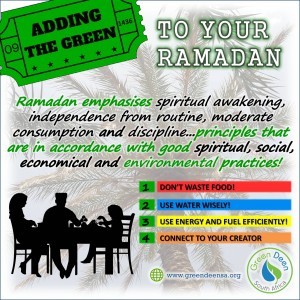A Ramadan of giving and of greening
- Published:
Earth Keeper newsletter wishes our Muslim brothers and sisters a blessed holy month of Ramadan. The start of Ramadan is expected around the 18th June with confirmation of the sighting of the crescent moon and will last until 17th July with the next crescent moon.
The dawn to dusk fasting observed by devout Muslims, a key element of the celebration of Ramadan, breaks the routine of everyday life. It is a month dedicated to strengthening faith by shifting the focus from our physical needs to spending time connecting with our Creator, our inner selves and our communities.
Muslim communities across the country are encouraging their followers to observe environmentally friendly practices this Ramadan. Sh. Dr Muhammad Ridwaan Gallant of the Muslim Judicial Council reminds us of the strong connection between poverty and environmental degradation and that compassion and giving to people in need is an important duty during Ramadan. This is stated in a number of passages in the Qur’ān, e.g. “And as for those who fast with difficulty, they have (a choice either to fast or) to feed a Miskîn (poor person) (for every day they do not fast)”. The Qur’ān: 2:184.
Muslims for Eco-Justice member Mariam Baderoon is co-ordinating the development of a calendar for environmental awareness and action for Ramadan. Watch this space as we will provide a link to the calendar within the next few days. In keeping with the traditions of Ramadan, The Claremont Main Road Mosque will be hosting evening prayers and water awareness has been identified as one of the key environmental themes for their congregation during Ramadan.
Eco-justice intern Sabirah Guzana will be giving a talk on water inspired by the Quranic ayah 24:45 at one of the evening prayers. In this text Allah speaks about how "He has created every living creature from water"
 GreenDeen Poster for Ramadan
GreenDeen Poster for Ramadan
thus giving water an elevated and noble status, which should encourage a sense of awe and protection in us with regards to our use of water. Sabirah’s talk will remind us of the Hadīth where the Prophet says one should not be wasteful even when performing wudu in a flowing river, inspireing us to be mindful of wastage even when we believe we have plenty at our disposal. Her aim is to raise awareness about South Africa’s current water crisis by way of stats and to propose a way forward by highlighting the active role that the ummah can play in decreasing their water foot-print as it is intrinsic of all Muslims to care for the environment.
The Green Deen recently launched their new website and recommendations for a greener Ramadan feature strongly: “Many aspects of us fasting in Ramadan reinforce environmental consciousness. From moderation
in consumption to self-discipline, the principles emphasised in Ramadan are in accordance with good spiritual, social, economic and environmental practices!” To strengthen your connection with creation this Ramadan and every day thereafter embrace a Green Ramadan and have a look at their article at http://greendeensa.org/index.php/2015/05/26/green-ramadan-2015/
Ramadan Mubarak
Kim Kruyshaar for SAFCEI 1 June 2015
Who we are

SAFCEI (Southern African Faith Communities’ Environment Institute) is a multi-faith organisation committed to supporting faith leaders and their communities in Southern Africa to increase awareness, understanding and action on eco-justice, sustainable living and climate change.
Featured Articles
-

South Africa: Who Ends Up Paying If DMRE Cooks the Price of Nuclear Power?
-

South Africa’s nuclear energy expansion plans continue to draw criticism, environmental NGOs chew over legal challenge
-

Earthlife Africa and SAFCEI respond to latest unsettling nuclear news regarding the ministerial determination
-

Open Wing Alliance Africa (Virtual) Summit 2023
-

The Green Connection and SAFCEI respond to energy minister's divisive and deflecting comments
-

Job Vacancy: FLEAT Coordinator







